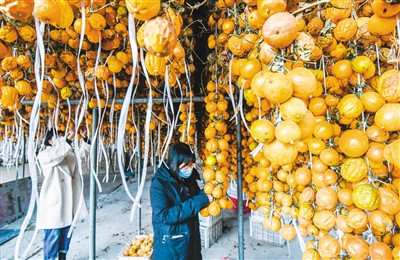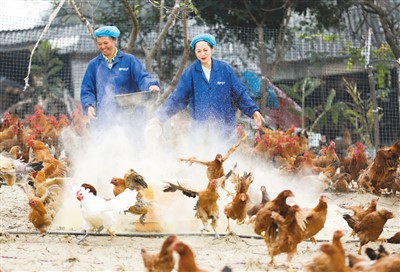Courtyard economy sees potential for growth
Courtyards are performing various functions for rural residents to run a business to increase their income. They can be turned into a homestay business, a parcel distribution site, a venue to host live-streaming sessions, a small supermarket, a repair shop, a household workshop and others.
"Let me show you around my courtyard," said Rozi, a farmer in Shufu county, northwest China's Xinjiang Uygur Autonomous Region. The courtyard, though not big, is planted with trees, pot plants and flowers. The man also plants grapevines, and has built a fruit orchard and enclosures for goats and cattle.

Two villagers dry Fructus Trichosanthis in their courtyard in Dibeitou township, Zunhua city, north China’s Hebei Province. (Photo/Liu Mancang)
"The small piece of land produces fruits and vegetables for my family. I raise cattle and goats for meat and also sell extra meat. I've also planted herbal plants in the courtyard because I heard that they can generate economic benefits," said Rozi, who earns a considerable amount of income a year through farming and running the courtyard.
The "courtyard economy" was included in China's "No. 1 central document" for 2023 for the first time. "The courtyard economy is necessary for consolidating the outcomes of poverty alleviation and preventing large-scale reemergence of poverty in rural areas. It is also an important way to increase incomes for rural residents," said He Anhua, a researcher with a research institute under the Ministry of Agriculture and Rural Affairs (MARA).
Statistics from the Ministry of Human Resources and Social Security showed that 32.78 million people, who had previously been impoverished, worked as migrant workers in 2022, an increase of 1.33 million people year-on-year.
For those who can't work outside their hometowns as migrant workers for various reasons, developing the courtyard economy can be a good choice to increase their income.
The courtyard economy benefits many parties, He said. It helps farmers fatten their pockets by making better use of their resources, improves the environment of villages, and facilitates the cultivation of specialty industries in rural areas. Agricultural products from the courtyards which are sold at the market can help the country enhance its food supply capacity.
China has rolled out policies to guide the development of the courtyard economy and identified several priority areas where efforts should be made to develop the courtyard economy, including planting specialty products, handicrafts, leisure tourism, and production and lifestyle services.

Two villagers feed chicken in their courtyard in Xinguang village, Qianxi city, southwest China’s Guizhou Province. (Photo/Zhou Xunzhao)
"Rural areas should develop the courtyard economy based on their own conditions and in a differentiated manner in a bid to cultivate many types of courtyard economy," He said.
Many localities have unveiled plans to develop the courtyard economy and used it as an important tool to push forward rural vitalization.
For instance, southwest China's Chongqing Municipality strives to develop the courtyard economy featuring fruit orchards, gardens, vegetable gardens, aquatic product breeding farms and husbandry grounds, which are related to the agriculture sector, as well as small businesses such as processing, catering, homestay, manufacturing and retail.
By arranging their courtyards, rural residents not only sell their specialty products but also provide tourism services, or turn their courtyards into venues for entrepreneurship and innovation, He explained.
By 2025, the courtyard economy will be developed on a larger scale, with more diverse types, more vitality and a higher level of development, according to the guidelines of the MARA and the National Rural Revitalization Administration on encouraging rural areas that have been lifted out of poverty to develop the courtyard economy.
Photos
Related Stories
Copyright © 2023 People's Daily Online. All Rights Reserved.









